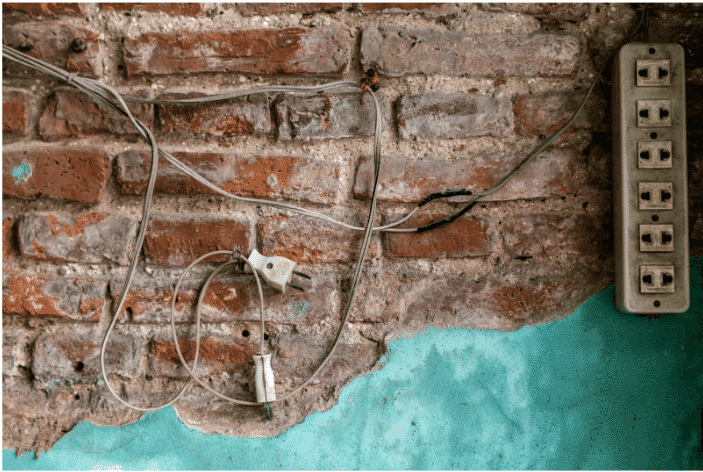Is Your Electrical Wire Suitable for Outdoor Use?

Choosing the suitable electric cable for outside is a big part of the puzzle with any project involving electrical work outside. It can contribute to your overall safety and efficiency, as using the wrong type of wire can pose significant risks, such as electrical fires, short circuits, and potential injuries.
We want you to know critical considerations for selecting the best outdoor electrical wire, focusing on weather resistance, insulation types, and overall longevity. Understanding these aspects lets you choose the best outdoor wire and cable for your needs.
Why Choosing the Right Outdoor Electrical Wire Matters
Safety Considerations
Regarding outdoor electrical wiring, the most important consideration is safety. Using improper wires can expose the electrical system to hazards such as moisture and physical damage, leading to electrical fires or short circuits. Outdoor environments are unpredictable, with elements like rain, snow, and temperature changes challenging electrical setups. Therefore, selecting wires designed specifically for outdoor use helps mitigate these risks by providing adequate protection against environmental factors.
Regulatory Compliance
Beyond safety, compliance with regulatory requirements matters. Outdoor electrical setups must comply with industry standards to ensure safe operation under various conditions. These standards cover insulation quality, resistance to weather conditions, and the ability to handle specific electrical loads. Choosing wires that meet these regulations helps prevent accidents and ensures the setup is legally compliant.
Key Factors to Consider When Selecting Outdoor Electrical Wire
Weather Resistance
Exterior electrical wires are constantly exposed to environmental elements that impact their performance and lifespan. Moisture, UV rays, and temperature fluctuations challenge outdoor electrical systems. Wires used outdoors must withstand these conditions without degrading. Wires with UV-resistant jackets are often necessary for setups exposed to direct sunlight. Wires that resist moisture are crucial for areas with high humidity or frequent rain.
You know the environments you work in well. Look for options that list what type of weather conditions they excel in. Options exist that are tailored more to specific weather conditions rather than catch-all “outdoor” electrical wire.
Insulation Types
The insulation of an electrical wire is a critical factor in determining its suitability for outdoor use. Insulation materials protect the conductors from environmental exposure and reduce the risk of electrical hazards. These three options are common insulation materials used for outdoor electrical wires.
- PVC (Polyvinyl Chloride): Commonly used due to its balance between flexibility and resistance to sunlight and moisture. However, it may become less flexible in freezing temperatures.
- Polyethylene (PE): Known for its flexibility and ability to withstand moisture, it is a good choice for colder climates.
- Cross-linked Polyethylene (XLPE) is excellently resistant to extreme temperatures and chemical exposure and is suitable for harsh environments.
Selecting the proper insulation depends on the specific conditions the wire will face. Each material offers different benefits, so understanding the environmental demands of the installation site is essential.
Long-Term Performance
For outdoor applications, choose a wire that can handle various physical and environmental stresses over time. Factors like abrasion resistance, impact resistance, and overall toughness are vital in determining the wire's ability to last. Wires with thicker insulation and strong jackets are generally more capable of resisting damage from physical impact, such as being struck by debris or chewed by animals. Additionally, wires that can resist corrosion from exposure to soil or water are vital for underground setups.
Common Types of Outdoor Electrical Wire
Overview of Wire Types
Several electrical wires are suitable for outdoor use, each with characteristics that make them appropriate for specific applications. Here are a few commonly used options.
- THHN (Thermoplastic High Heat-Resistant Nylon-Coated Wire): Often used in conduit applications where it is protected from direct exposure to the elements. THHN wires have good heat resistance and are relatively easy to work with.
- UF-B (Underground Feeder Cable): Designed for direct burial without conduit, this wire type is moisture-resistant and has a rugged exterior jacket that protects against underground conditions. It is often used for outdoor lighting and other underground electrical projects.
- MC (Metal-Clad Cable): This cable features a metal sheath that provides mechanical protection and is suitable for outdoor and exposed locations where additional physical protection is needed.
Specific Use Cases
Understanding the specific use cases for each type of wire can help determine which is best for your needs.
- THHN: Best used in above-ground conduit setups where the wire is protected from direct weather exposure.
- UF-B: Ideal for underground setups, including landscape lighting, outdoor receptacles, and other exterior electrical systems.
- MC: Suitable for areas where you may expose the wire to potential physical damage or need to be installed in challenging environments, such as outdoor machinery or equipment.
Pros and Cons
Each wire type comes with its own set of benefits and limitations. v
THHN:v
- Pros: Easy to install in conduit, good heat resistance, flexible.
- Cons: It requires additional protection from the elements and is unsuitable for direct burial.
UF-B:
- Pros: It can be directly buried, is resistant to moisture and environmental conditions, and is a rugged jacket.
- Cons: Less flexible than THHN, more challenging to install in tight spaces.
MC:
- Pros: Provides good protection against physical damage and is suitable for exposed applications.
- Cons: Heavier and more difficult to work with, typically more costly than other types.
Making the Best Choice for Your Needs
Choosing the right exterior electrical wire involves considering several factors, including weather resistance, insulation type, and specific application requirements. Understanding the types of cables available and their benefits and limitations allows you to select the best option for your project.
If you are looking for outdoor wire that meets high safety and effective performance standards, consider exploring our range of products. Contact us today to learn more about our products and find the right wire for outdoor electrical needs.